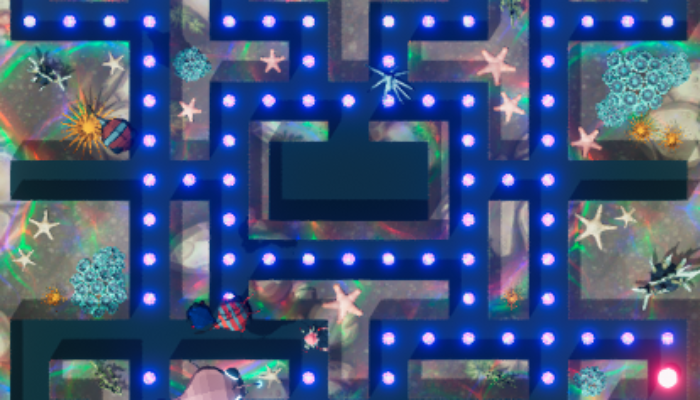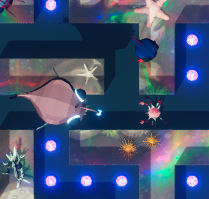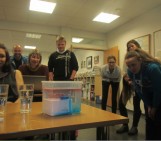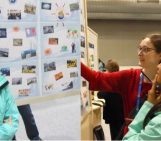
Ocean acidification could be described as climate change’s evil twin, not that it needs one. The world’s oceans are partly absorbing the carbon dioxide we are pumping into the planet’s atmosphere, which then reacts with seawater and forms carbonic acid. This process decreases the pH of the oceans, making them more acidic.
If you are a crab resident of the ocean, this is not good news. Normally, the sea floor is a good place to be and a hungry crab can easily sniff out its food. But the crabs are adapted for an ocean with a pH range around 8.1 and as their world becomes more acidic, it becomes much harder for them to smell their food. This is because the increased acidity alters the chemicals marine animals rely on to find food, look after their young, and identifying safe places to settle (Roggatz et al, 2016; Velez et al, 2019).
Another issue for the poor little crabs is that the level of awareness of ocean acidification amongst the public is low, with even fewer acknowledging the direct link with climate change. The problem itself is invisible and its impacts are extremely distant to the people’s lives, yet current predictions suggest that by the end of century ocean pH could drop as low as 7.7 (Bopp et al, 2013; IPCC, 2014). How can people possibly relate to something that will happen in the future in a corner of the world they are never likely to visit?
Games are a powerful tool for putting you in someone, or something, else’s shoes. In our game, Crabby’s Reef, we put you in the metaphorical shoes of Crabby, the crab, as it navigates daily life within an ocean reef. Inspired by classic arcade games, you have to guide Crabby through the maze-like reef, seeking food and avoiding the octopuses who would make Crabby dinner. With each new level you are transported to a more acidic future, your senses dampened by blurring the screen, reflecting Crabby’s loss of ability to smell the food.
Thanks to the EGU Public Engagement Grant we will be able to have an arcade cabinet custom built to house Crabby’s Reef when we take it to events. In the future, we will further develop the game to use virtual reality, providing people a true Crabby-eye view of the impacts ocean acidification will have on the undersea environment. The combination of competitive game and virtual reality will be a popular and effective method of introducing the issue of ocean acidification to people.
The game has been developed by the SeriousGeoGames Lab, part of the Energy and Environment Institute, University of Hull, UK, with support from BetaJester Ltd. To celebrate Worlds Oceans’ Day we are making an online version of Crabby’s Reef available to play, for free on the SeriousGeoGames website. We are also using the game to support The Deep aquarium in Hull, UK. The Deep is an international player in marine conservation, working on pioneering research schemes to protect the future of our oceans. Conservation is at the heart of everything they do, and as they rely on visitors to continue this work they have been particularly affected by the Covid-19 lockdown. Although the game itself is free to play for anyone who is interested, we hope those who enjoy Crabby’s Reef will support The Deep in whatever way they feel is appropriate. Later on this summer, the game itself will move to The Deep’s website.
Play Crabby’s Reef for FREE!
References:
Bopp, L., Resplandy, L., Orr, J. C., Doney, S. C., Dunne, J. P., Gehlen, M., Halloran, P., Heinze, C., Ilyina, T., Séférian, R., Tjiputra, J. and Vichi, M.: Multiple stressors of ocean ecosystems in the 21st century: projections with CMIP5 models, Biogeosciences, 10(10), 6225–6245, doi:10.5194/bg-10-6225-2013, 2013.
IPCC: Climate Change 2014: Synthesis Report. Contribution of Working Groups I, II and III to the Fifth Assessment Report of the Intergovernmental Panel on Climate Change, Synthesis report, Intergovernmental Panel on Climate Change (IPCC), Geneva, Switzerland., 2014.
Roggatz, C. C., Lorch, M., Hardege, J. D. and Benoit, D. M.: Ocean acidification affects marine chemical communication by changing structure and function of peptide signalling molecules, Global Change Biology, 22(12), 3914–3926, doi:10.1111/gcb.13354, 2016.
Velez, Z., Roggatz, C. C., Benoit, D. M., Hardege, J. D. and Hubbard, P. C.: Short- and Medium-Term Exposure to Ocean Acidification Reduces Olfactory Sensitivity in Gilthead Seabream, Frontiers in Physiology, 10, doi:10.3389/fphys.2019.00731, 2019.
Wittmann, A. C. and Pörtner, H.-O.: Sensitivities of extant animal taxa to ocean acidification, Nature Climate Change, 3(11), 995–1001, doi:10.1038/nclimate1982, 2013.





